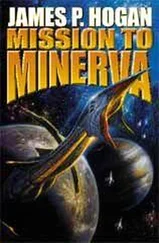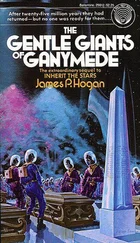But what made the anquiloc more than just “peculiar” was the way it came preprogrammed with the right maneuvers to deal with the latest to have appeared from the chiffs repertoire of routines for evading it. And it was not simply a statistical effect, where newborn anquilocs possessing all possible varieties of behavior appeared equally, and only the ones that happened to be “right” at the time survived.
Newborn individuals exhibited the same response pattern as the latest that the parents had learned up to the time of conception. Since that pattern changed depending on the current mode of chiff behavior, the mechanism represented a clear case of inheriting a characteristic that had been acquired by the parent during life and not carried by the gene line-a flat contradiction of the principle determined by generations of researchers on Earth. Jevlenese and Ganymean scientists had long before settled the point by training anquilocs in certain tasks and testing their offspring for the ability after separating them at birth, and there was no doubt of it. Neither was it the only instance of the phenomenon that they had encountered in their probings of the nearby regions of the Galaxy.
But for the biologists of Earth it was a revelation that went against all the rules, throwing some of their most precious tenets into as much disarray as their colleagues from the physical sciences were already having to come to terms with.
Professor Christian Danchekker operated a tracker ball on the control panel of the molecular imager and peered at the foot-high hologram as it rotated in the viewing space in front of him. He tapped a command key to create a ghostly sphere of faint light, about the size of a cherry, and turned the tracker ball again to guide the sphere until it enclosed a selected part of the image. Then he spoke in a slightly raised voice toward a grille in the panel to one side.
“Voice on. Magnify by ten.” The part of the image that had been inside the sphere expanded to fill the viewing space and resolved itself into finer detail. “Reduce by five…“ Danchekker rotated the image some more and repositioned the sphere slightly. “Magnify by ten, increase contrast ten percent… Voice off.”
For a few moments he sat back and contemplated the result with satisfaction tinged by a dash of undisguised amazement. He was tall and sparse in build, with a balding head and antiquated, gold-rimmed spectacles perched precariously on a hollowed, toothy face. The assistant seated on another chair called a set of neural mapping charts, heavily annotated with symbols, onto one of the auxiliary display screens while she waited.
“There it is, Sandy,” Danchekker murmured. “The base sequence has altered. Run a delta-sigma on the code and correlate it against the map. But I have no hesitation in predicting, now, that you’ll find it embedded there. This is how it transfers.”
Sandy Holmes leaned forward and studied the enhanced section of the molecule’s structure now being presented. “It’s a cumulative progression from what we had before,” she commented.
Danchekker nodded. “Which is what one would expect. As the learned routine is registered by the nervous system, the encoded representation impressed into the messenger increases. We’re actually looking at transferable memory in action.”
They had taught some anquilocs, brought from Jevlen, to adapt to artificial patterns of IR return signals resembling chiff evasion responses. The changes written into the configuration of circulating electrical currents in the brain as a permanent imprint of the learned behavior could then be identified and mapped by the established techniques of neural psychotopography.
But the molecule that they were studying represented a step far outside the bounds of familiar terrestrial biology. It was created in specialized cells of the anquioc’s nervous system and carried a chemical encodement of the changes recorded in regular memory. Acting as a messenger, it transported the code to the reproductive cells, where it was copied into the animal’s genetic control molecules as they replicated. Hence, it provided the equivalent of reprogrammable DNA.
Danchekker went on, “The possibilities of further evolutionary refinement of such an ability are intriguing. For example, can you imagine-” The call-tone from the terminal on a table by the far wall interrupted him. “Damn. Go and see to the wretched thing, would you, Sandy?” he muttered.
The girl got up, crossed the laboratory, and touched a key to accept the call. A woman’s face appeared on the screen, mid-fortyish, perhaps, with hair tied straight back in a matronly fashion that added to her years. She had a long, sober face with beady dark eyes, high cheeks, and a large nose, and stared out with a commanding sternness.
“Is Professor Danchekker there, Ms. Holmes?” Her voice was shrill but firm, brooking no nonsense. “It is most imperative that I speak to him.”
“Oh, God,” Danchekker groaned, over by the imager console. It was Ms. Mulling, the personal secretary who had come with his appointment as director of Alien Life Sciences, calling from her domain in his outer office on the top floor, from where she ruled the building. Danchekker shook his head and made frantic to-and-fro motions with a hand to indicate that he had spontaneously evaporated off the planet.
But the movement in the background over Sandy’s shoulder only caught Ms. Mulling’s attention. “Ah! You are there, Professor. The budgetary review meeting is due to begin in M-6 in thirty minutes. I presumed that you would want reminding.” She rolled the rs and spoke with as much of a hint of disapproval in her voice as a personal secretary with a strict sense of propriety could permit.
Danchekker rose from the console and advanced toward the terminal, stopping halfway across the floor as if wary of too close a proximity, even to an image. Sandy withdrew discreetly out of the viewing angle. “Can’t Yamumatsu deal with it?” Danchekker asked irritably. “He understands convertible assets, depreciation ratios, and other such intricacies-I am only a scientist. I spoke to him this morning, and he said he’d be happy to substitute.”
“It is customary for the departmental director to chair the quarterly review,” Ms. Mulling replied in a tone as yielding as the hull armor of a battleship.
“How can it be customary?” Danchekker challenged. “The department is new. The division itself is barely six months old.”
“The precedent derives from UNSA Corporate standard procedures, which predate the new organizational structure and have not been changed.” Ms. Mulling’s eyes moved up and down to take in his full length. “What on earth are you doing in those?” she demanded before Danchekker could respond. Following her gaze, he looked down at his feet. To save time getting to a black-tie dinner that evening which he had been unable to evade, he was already wearing evening dress underneath his lab coat-except for his shoes, which were of white, rubber-soled canvas.
“What do they look like?” he riposted. “They are popularly referred to, I believe, as sneakers.”
“I know. But why are you wearing them with evening dress?”
“Because they are comfortable, of course.”
“You can hardly appear at the Republican Society dinner like that, Professor.”
The light glinted off Danchekker’s spectacles and teeth. “Madam, I have no intention of doing so. I shall be changing them before I depart. Do you wish me to produce my patent leather pair from the closet and show them to you as proof?”
“That won’t be necessary, thank you. But such a combination wouldn’t be appropriate for the review meeting, I’m afraid. After all, both the deputy financial comptroller and the executive vice-president of planning will be attending.”
Читать дальше











